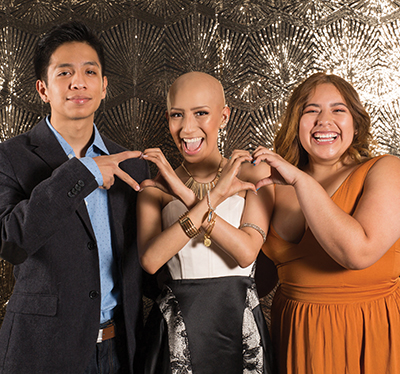Creating A Survivorship Community For Young Adults

Adolescents and young adults with cancer (AYAs) travel a different road than do younger children and mature adults. These AYAs are at an age where they feel invincible— they are young, healthy and on the verge of independence. Yet a diagnosis of cancer abruptly puts their plans and dreams on hold. They are caught in-between two worlds – pediatric cancer treatment, with its focus on children, and adult cancer programs where they can feel lost and isolated.
“Research has shown that overall long-term survival rates are exponentially better for AYAs treated at a pediatric facility that has cancer clinical trials and program activities geared to their unique needs,” notes Sharon Bergeron, RN, BSN, CPON, Research Educator, Hyundai Cancer Institute at CHOC Children’s.
“In response to this research, we have created a community at CHOC Children’s through our AYA program to support these young patients,” Sharon says. “It makes no sense to get them through a cancer diagnosis if they have nothing to look forward to, no future. We want to give them that future.”
Sharon notes that the CHOC Children’s AYA program is carefully designed to give patients life skills while providing emotional support both during treatment and as survivors.
With this established AYA community, CHOC has given AYA patients the ability to have a strong voice in creating a program that focuses on their unique situation.
“We are investing in their survivorship,” she says. “We work closely with CHOC Children’s long-term follow-up medical clinic ACTS: After the Cancer Treatment Survivorship Program to help these young people prepare for the future.”
This past spring, the AYA program held its first job fair, attracting companies from throughout the Orange County area, as well as organizations that help students with learning differences succeed in college.
Leadership is a key focus of the CHOC Children’s AYA program. The program has a patient leadership group composed of patients and siblings that meet every other month with a multidisciplinary team of child life specialists and healthcare professionals who plan activities and give their input on how to address a variety of situations that are unique to these patients.
Patient leaders have also held two AYA spring retreats that have focused on both leadership/mentorship skills and wellness and survivorship to enhance the learning experience for the AYA patient and promote a mindset towards the future. This program has extended to a pilot yoga program, along with established activities in creative writing, art and music therapy.
The AYA program has recently gained nationwide attention. A poster that highlighted the mentor retreat earned 1st place honors in December 2017 at the 2nd Global AYA Cancer Congress in Atlanta, Georgia. And five CHOC AYA cancer patients were featured in the 2018 SCAPHON Nursing Conference Keynote Address moderated by Kara Noskoff that also highlighted our AYA program and understanding the AYA patient experience.
“None of this would be possible without the help of an incredibly generous community of concerned individuals who see the potential in these amazing patients,” Sharon says. “This includes the generous donation of the Hunsakers, for whom are program is now named: Richard C. and Virginia A. Hunsaker Adolescent and Young Adult Oncology Child Life Program.” (Please see accompanying story.)
Sharon says, “These kids are fighters. And our goal is to empower them to succeed, lead and thrive.”

A national model, CHOC’s program offers a host of activities designed to encourage bonding
and increase self-esteem among a unique patient population.











